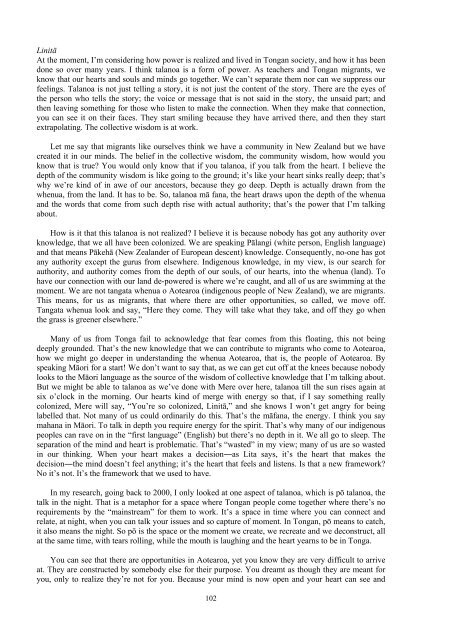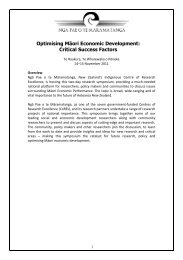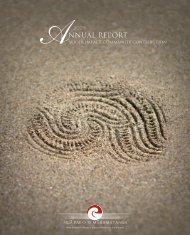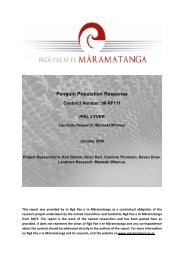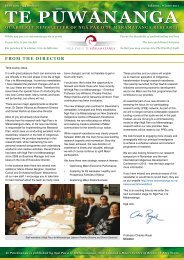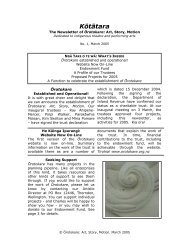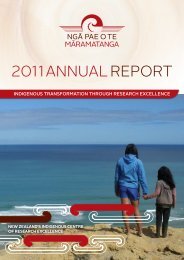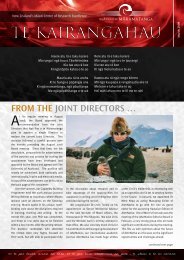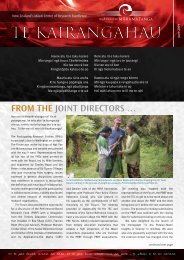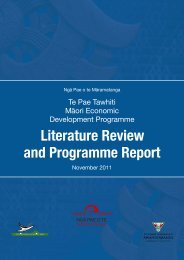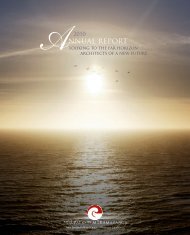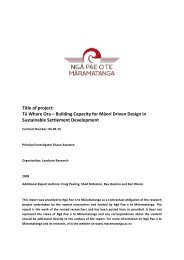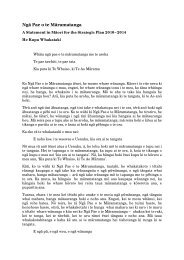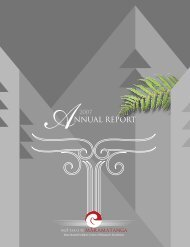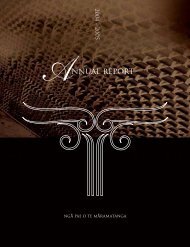traditional knowledge conference 2008 te tatau pounamu
traditional knowledge conference 2008 te tatau pounamu
traditional knowledge conference 2008 te tatau pounamu
You also want an ePaper? Increase the reach of your titles
YUMPU automatically turns print PDFs into web optimized ePapers that Google loves.
LinitāAt the moment, I’m considering how power is realized and lived in Tongan society, and how it has beendone so over many years. I think talanoa is a form of power. As <strong>te</strong>achers and Tongan migrants, weknow that our hearts and souls and minds go together. We can’t separa<strong>te</strong> them nor can we suppress ourfeelings. Talanoa is not just <strong>te</strong>lling a story, it is not just the con<strong>te</strong>nt of the story. There are the eyes ofthe person who <strong>te</strong>lls the story; the voice or message that is not said in the story, the unsaid part; andthen leaving something for those who lis<strong>te</strong>n to make the connection. When they make that connection,you can see it on their faces. They start smiling because they have arrived there, and then they star<strong>te</strong>xtrapolating. The collective wisdom is at work.Let me say that migrants like ourselves think we have a community in New Zealand but we havecrea<strong>te</strong>d it in our minds. The belief in the collective wisdom, the community wisdom, how would youknow that is true? You would only know that if you talanoa, if you talk from the heart. I believe thedepth of the community wisdom is like going to the ground; it’s like your heart sinks really deep; that’swhy we’re kind of in awe of our ancestors, because they go deep. Depth is actually drawn from thewhenua, from the land. It has to be. So, talanoa mā fana, the heart draws upon the depth of the whenuaand the words that come from such depth rise with actual authority; that’s the power that I’m talkingabout.How is it that this talanoa is not realized? I believe it is because nobody has got any authority over<strong>knowledge</strong>, that we all have been colonized. We are speaking Pālangi (whi<strong>te</strong> person, English language)and that means Pākehā (New Zealander of European descent) <strong>knowledge</strong>. Consequently, no-one has gotany authority except the gurus from elsewhere. Indigenous <strong>knowledge</strong>, in my view, is our search forauthority, and authority comes from the depth of our souls, of our hearts, into the whenua (land). Tohave our connection with our land de-powered is where we’re caught, and all of us are swimming at themoment. We are not tangata whenua o Ao<strong>te</strong>aroa (indigenous people of New Zealand), we are migrants.This means, for us as migrants, that where there are other opportunities, so called, we move off.Tangata whenua look and say, “Here they come. They will take what they take, and off they go whenthe grass is greener elsewhere.”Many of us from Tonga fail to ac<strong>knowledge</strong> that fear comes from this floating, this not beingdeeply grounded. That’s the new <strong>knowledge</strong> that we can contribu<strong>te</strong> to migrants who come to Ao<strong>te</strong>aroa,how we might go deeper in understanding the whenua Ao<strong>te</strong>aroa, that is, the people of Ao<strong>te</strong>aroa. Byspeaking Māori for a start! We don’t want to say that, as we can get cut off at the knees because nobodylooks to the Māori language as the source of the wisdom of collective <strong>knowledge</strong> that I’m talking about.But we might be able to talanoa as we’ve done with Mere over here, talanoa till the sun rises again atsix o’clock in the morning. Our hearts kind of merge with energy so that, if I say something reallycolonized, Mere will say, “You’re so colonized, Linitā,” and she knows I won’t get angry for beinglabelled that. Not many of us could ordinarily do this. That’s the māfana, the energy. I think you saymahana in Māori. To talk in depth you require energy for the spirit. That’s why many of our indigenouspeoples can rave on in the “first language” (English) but there’s no depth in it. We all go to sleep. Theseparation of the mind and heart is problematic. That’s “was<strong>te</strong>d” in my view; many of us are so was<strong>te</strong>din our thinking. When your heart makes a decision―as Lita says, it’s the heart that makes thedecision―the mind doesn’t feel anything; it’s the heart that feels and lis<strong>te</strong>ns. Is that a new framework?No it’s not. It’s the framework that we used to have.In my research, going back to 2000, I only looked at one aspect of talanoa, which is pō talanoa, thetalk in the night. That is a metaphor for a space where Tongan people come together where there’s norequirements by the “mainstream” for them to work. It’s a space in time where you can connect andrela<strong>te</strong>, at night, when you can talk your issues and so capture of moment. In Tongan, pō means to catch,it also means the night. So pō is the space or the moment we crea<strong>te</strong>, we recrea<strong>te</strong> and we deconstruct, allat the same time, with <strong>te</strong>ars rolling, while the mouth is laughing and the heart yearns to be in Tonga.You can see that there are opportunities in Ao<strong>te</strong>aroa, yet you know they are very difficult to arriveat. They are construc<strong>te</strong>d by somebody else for their purpose. You dreamt as though they are meant foryou, only to realize they’re not for you. Because your mind is now open and your heart can see and102


